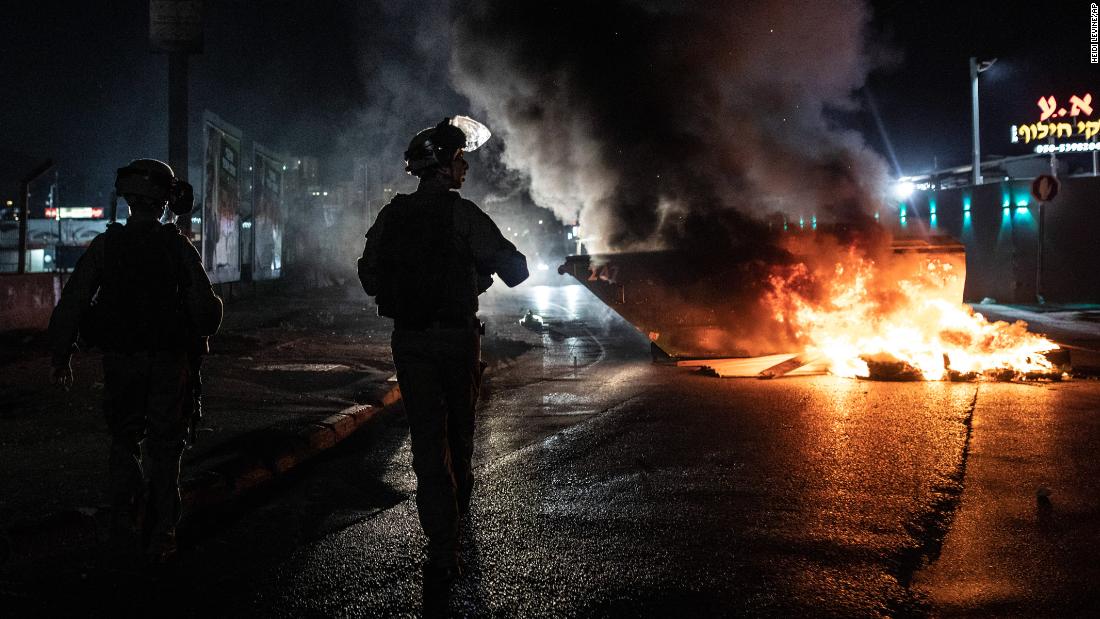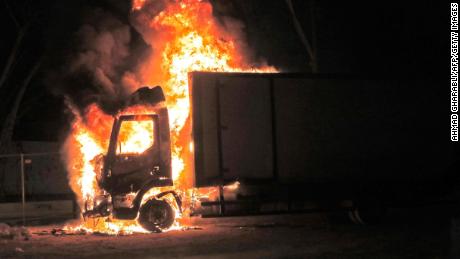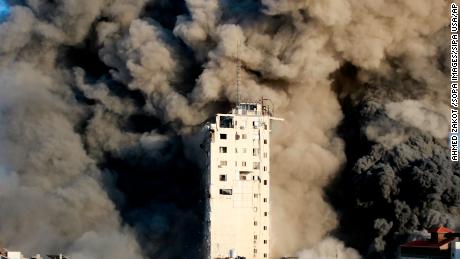Israel warns of ‘more targets’ as clashes between Arabs and Jews rock Israeli cities
Israel Defense Forces (IDF) spokesman Hidai Zilberman said Israel was considering a ground incursion into Gaza, but stressed that any decision would “take days.”
Three Israeli brigades are currently deployed around Gaza. When asked by Israel Channel 12 News whether the troop movements were paving the way for a ground invasion, Zilberman responded: “We are amassing forces on the border, getting them prepared. Soldiers are learning the terrain. Getting ready. We will activate them when we decide to activate them. We have the initiative. We have time.”
Zilberman said the option for an incursion was on the table and that the Israeli military was amassing forces for that eventuality. Israel has called up 7,000 army reservists so far, he added.
Most analysts believe that a single division’s worth of armor and infantry — the current build-up — is not sufficient to conduct such an operation.
The warning from the Israeli military came as tensions continued to escalate on Thursday. Militants in Gaza have fired more than 1,000 rockets into Israel since the latest flareup began Monday afternoon, and Israel has responded with devastating airstrikes in Gaza.
Israel’s bombing campaign in Gaza has now killed at least 103 people, including 27 children and 11 women, the Gaza-based Palestinian Health Ministry reported Thursday. At least 580 people have sustained various injuries, the ministry said.
Seven Israelis have been killed and more than 200 have been injured since Monday, the Israeli military said. A six-year-old boy was killed Wednesday when a rocket fired from Gaza struck a residential building in Sderot, according to an emergency responder.
Addressing Israeli troops Thursday, Defense Minister Benny Gantz said: “I say explicitly: we will continue to defend and continue to attack until the fire is stopped and we will ensure long-term silence.”
Rioting and violent clashes between Arab and Jewish citizens also swept across several Israeli cities this week, leading Israeli Prime Minister Benjamin Netanyahu to warn against “lynching” by either community.
In Bat Yam, south of Jaffa, graphic video Wednesday night showed a Jewish right-wing mob trying to lynch an Arab driver. Police say the man was dragged from his car before the assault began. Video shows about 20 people hitting him with metal objects and kicking him in the head repeatedly. He was taken to hospital where his injuries were described by police as moderate.
In Acre, north of Haifa, a lynching attempt by an Arab mob left a Jewish man critically wounded, according to Israeli police. A police spokesman said the mob attacked police officers with stones before attacking the victim with stones and iron bars.
Israel’s Ambassador to the UN, Gilad Erdan, wrote to the Security Council on Thursday urging it to strongly condemn what he called terrorist attacks from Gaza, as well as to support Israel’s “right to defend itself,” according to a statement.
A day earlier, the Palestinians wrote to the UN Security Council President and the General Assembly President appealing for the Council to live up to its responsibility to maintain international peace and security.
No ceasefire for now
An Israeli foreign ministry spokesperson ruled out a ceasefire with Hamas in Gaza on Thursday.
“We don’t think this is the right time for a ceasefire,” Lior Haiat told CNN. “This is the time where Israel should defend itself and attack the terror infrastructure of Hamas… and we will get to a point where Hamas will understand that launching this kind terror attack on Israeli civilians is not effective for the future.”
Asked on whether any mediating countries have sent representatives to Israel, Haiat said “he does not have this information … but a ceasefire is not on the table for Israel now.”
A senior Hamas official, Izzat Al Rishq, told CNN earlier Thursday that Egypt, Qatar and the United Nations were communicating with Hamas over mediation to end the fighting.
“We in Hamas have told them that they should speak to the enemy to stop the aggression first and after that, Hamas will decide,” Al Rishq said.
“We stress that we have the ability to sustain ourselves for the long haul and respond to the aggression (for) as long as it takes.”
Netanyahu slammed the communal violence in Israeli cities Wednesday as “unacceptable” and said he had ordered the police to adopt emergency powers, to reinforce with Border Police units, and to impose curfews where necessary.
“Nothing justifies the lynching of Jews by Arabs and nothing justifies the lynching of Arabs by Jews,” he said in a statement.
“To the citizens of Israel I say that I do not care if your blood is boiling. You cannot take the law into your own hands,” Netanyahu added. “You cannot grab an ordinary Arab citizen and try to lynch him — just as we cannot watch Arab citizens do this to Jewish citizens.”
“We are very, very worried about this deterioration,” Israeli lawmaker Aida Touma-Suleiman in Acre told CNN’s Hala Gorani in a live interview late Wednesday evening local time.
“The tear gas is filling the houses, and the situation is insecure. There has been attacks on Arab citizens in different cities today,” she said. “I’m really, really worried about this city (Acre). The same is happening in Haifa. The same is happening in Lod. There are different attacks on different citizens.”
The Israeli-Arab lawmaker went on to say: “I’m not sure that the police is able or even willing to control the situation.”
Decades of coexistence ‘trampled’
Fury over the situation has fueled fierce protests in the central Israeli city of Lod, where Israeli police reported Wednesday that people were throwing rocks at passing cars and blocking roads into the early hours.
The mayor of Lod, Yair Revivo, said decades of coexistence had been “trampled.”
He said Arab-Israeli rioters had been “burning synagogues, Talmud Torah, dozens of vehicles, burning garbage containers, destroying Israeli flags and worse, lowering the Israeli flag and hoisting the Palestinian flag, on a night of riots that injured policemen and residents who found themselves besieged.”
Meanwhile an Arab-Israeli resident of Lod, Wael Essawi, told CNN that a mosque was stormed by Israeli police and Jewish residents during prayers on Tuesday night before tear gas was fired and cars were set ablaze.
“We couldn’t do anything but we opened the windows so we can breathe… it was very intense,” Essawi said.
Another resident, Khaled Zabarqah, said that following a Palestinian demonstration on Monday against Israeli policies in Jerusalem, thousands were hit with tear gas, stun grenades and rubber bullets before Israelis started throwing stones and beating the group.
“My 15-year-old daughter was woken up by the sound of stones being thrown at her bedroom window, I was then woken up by her terrified screams,” Zabarqah said.
“There was nothing we could do but protect and defend ourselves with any tools we have, it’s either we defend ourselves or we get killed,” he said.
On Tuesday, a 25-year-old Arab-Israeli man was shot and killed in the city by a 34-year-old Jewish man, who fired on protesters after they targeted him with rocks, according to police.
Police arrested two suspects in connection with another shooting also in Lod.
Communal violence was also reported Wednesday in the Israeli cities of Tiberias, Umm al-Fahm and Hadera.
Unrest has also spread to the West Bank and East Jerusalem, where at least 322 Palestinian protesters were injured during clashes with the Israeli army in the West Bank and with Israeli police in East Jerusalem on Wednesday, according to a Palestinian Red Crescent handout obtained by CNN.
Israel: ‘Terror targets’ struck
The Israeli military said Thursday it had struck more than 600 “terror targets” in Gaza since the recent hostilities began.
Israel has been “able to strike a significant part if not the majority of the military leadership of Hamas” in the past three days of bombardment, IDF spokesman Lt. Col. Jonathan Conricus told reporters.
Israel did not yet have an exact number of enemy combatants killed, Conricus said. “As of yesterday it was more than 30. It has risen since,” he said.
Palestinian militants have fired more than 1,600 rockets, Conricus said. “Approximately 400 have fallen short inside the Gaza Strip and the interception rate continues at an average of 90%,” he said.
The IDF has struck “significant parts” of Hamas’ and Islamic Jihad’s rocket-firing capability, he added, “but it is by no means totally degraded.”
The Izz ad-Din al-Qassam Brigades, the military wing of Hamas, said in a statement Thursday that it had carried out drone attacks on Israeli targets using new “homemade ‘Shehab’ drones.”
In a tweet, IDF spokesperson Avichay Adraee said Israeli forces were aware of the brigade’s drone fleet and were able to “hit” them.
Global airlines — including Delta Air Lines, American Airlines, United Airlines, Lufthansa and British Airways — have all canceled flights to Israel amid the escalating violence.
CNN’s Eyad Kourdi, Ibrahim Dahman and Sugam Pokharel contributed to this report, as did journalist Ali Younes.
![]()














